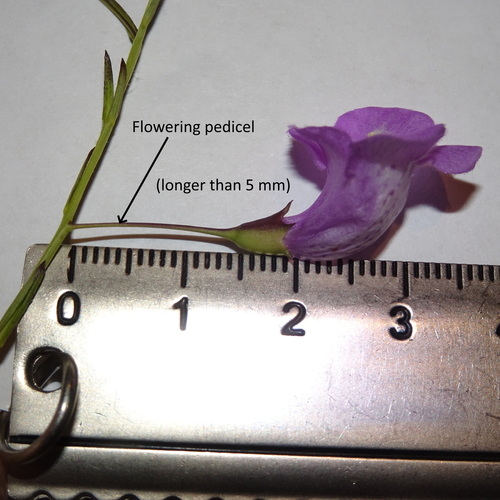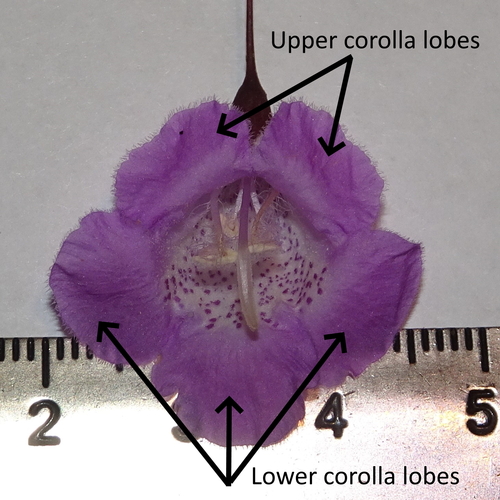False Foxgloves: how to know the species of Agalinis in Texas
False Foxgloves (Agalinis) produce attractive, purple blossoms in late summer through fall. The distribution of these species are poorly documented, so our observations can help with that. There are several species in Texas that are quite similar yet unique in subtle ways.
Here's a guide that I put together as an attempt to note distinguishing features:
https://docs.google.com/presentation/d/1jQ4yVFHhCZ2Yhy7v_Z3ngp-tZIvOKN3UtCBm0mOBbg4/edit?usp=sharingGenerally speaking, here are some features that must be documented (always take pictures of multiple flowers and multiple stems to capture the variation):
- length of flowering pedicel (relative to length of calyx)
- length of leaves relative to pedicels
- orientation of leaves (clasping stem or perpendicular to stem)
- length of corolla lobes (all the same, or upper shorter than lower)
- orientation of upper corolla lobes (reflexed or arching over stamens)
- size of flower (pay attention if small: 8-13 mm long)
- length of lobes of calyx (relative to tube of calyx)
- shape of leaves (threadlike, flat-narrow, flat-broad, divided)
- leafyness (presence of well developed axillary fascicles "extra leaves")
- I recommend that folks carry with them a white pillow case to use as a backdrop for photographing the plants (if you're serious about getting a good ID--especially for those rare eastern species where leaf length, shape, and density are critical).
BONAP maps of Agalinis: http://bonap.net/Napa/TaxonMaps/Genus/County/Agalinis (not accurate or up to date)








Comentarios
@kimberlietx, @sambiology, @connlindajo, @eric_keith, @rymcdaniel, @alisonnorthup, @anewman, @bob777, @dan_johnson
Feel free to tag anyone else that you might think is interested in documenting False Foxgloves and contributing to ID tips and tricks.
Great! Perfect timing, too. Have you looked at existing observations to see if the multitude of A. heterophylla could be a different species?
@suz You were right... this is the plant that has been driving me crazy all summer.
I have seen A. heterophylla flowering in several sites in the last 2 weeks.
I have seen Agalinis densiflora in 5 sites in the last few weeks.
Looks like iNat currently (as of 2019 Sep 5) has 1,214 observations including 15 species (if they are correct?) in Texas, with 609 listed as A. heterophylla. I will be interested to revisit my own 15 observations.
https://www.inaturalist.org/observations?locale=en&place_id=18&preferred_place_id=1&taxon_id=62403&view=species
@kimberlietx, as of now, I'm still too green to verify any IDs. I'm working through keys and descriptions and labeling pictures for a visual guide. At that point, maybe some more experienced souls can verify the guide's accuracy and improve it as needed.
Here's Shinners & Mahler's key in Flora of North Central Texas:
https://drive.google.com/open?id=1fqFG1Glxc6IoQ1jaDYsqed3iJHbwoQiX
(this key is missing A. strictifolia, which does occur in ncTX).
I'll try to post a state-wide key tomorrow.
Let me know if I can help out :)
Wow! That's even tougher than anemones! I'll keep my eye out and do what I can.
OK, brave souls! Here's the key to species of Texas (as of 1970, at least): https://drive.google.com/open?id=1Cs-54_JpAsEO8j0pd9ysySALh3aJKNCW
Alright. So I've found two species growing in the same square foot of soil behind my house, and it's really cool to compare them side by side. I'm really liking the False Foxgloves. Some are easy to distinguish--and I've been brave enough to "correct" a few observations. However, there are some species that have me stumped. The key to species of TX is missing three species: densiflora (easy), harperi (hard), and navasotensis (hard). Anyone can add comments to the guide that I'm working on: https://docs.google.com/presentation/d/1jQ4yVFHhCZ2Yhy7v_Z3ngp-tZIvOKN3UtCBm0mOBbg4/edit?usp=sharing
@kimberlietx, help!
@kimberlietx, I'm brave enough to start looking through the A. heterophylla--I know enough to know what is NOT heterophylla. LOTS of misidentifications, but many of them are the short-pedicel, east TX species that I'm having trouble with.
I've looked at all TX observations of the following species, and they now appear to be soundly identified: strictifolia, maritima, homalantha, and tenuifolia.
@eric_keith, interested in helping out with this project?
I can't make a huge commitment because of my work load the rest of the year, but if you get stuck on something, I can help. Also, feel free to use all my images. I have most of the species except A. pulchella, which is now very rare or extirpated in Texas. Should be still in frequently burned longleaf pine habitats. A. harperi is most common on Catahoula outcrops in Texas, also along the edge of seepage bogs in Angelina, Jasper, and Newton Counties. It's still quite rare, however. A. purpurea is way more common.
I looked at all 1,281 records of Agalinis in Texas (whew!) and now I think I know the false foxgloves a little better. Last month, they were just a weed to be overlooked! I've only personally seen two species, but hopefully will see more with time and travel. I found some hidden gems among the unidentified and misidentified. And I hope I haven't misidentified anything myself. I'm still adding pics to the guide, and am still trying to get a grasp of distinguishing features of the more rare eastern species. I recommend that folks carry with them a white pillow case to use as a backdrop for photographing the plants (if you're serious about getting a good ID--especially for those rare eastern species where leaf length, shape, and density are critical).
@troutlily57 @jbe_fleischman_fam You might find the guide to ID of different Agilinis species interesting. Click on links above provided by @pfau_tarleton. We should keep at eye out at SRP, see if we can find for A. auriculata!!
@pfau_tarleton Thank you for creating this tool and sharing it! Very helpful😁 👍
Thank you @pfau_tarleton and you too @lpenn for pointing me here! I have not attempted to confirm Agalinis postings on iNat for this exact reason.
I have started a file on my phone with your identification guides. Thank you very much!!!!
Last year I started seeing Agalinis blooming behind my house at end of August. This year, not a single plant exists, much less blooming. I suppose timing of rainfall?
Excellent guide! Thanks for putting this together. I will have to look a little closer and take better pictures the next time I find some. I've always assumed they were pretty much the same species in my area.
Thank you!
Agregar un comentario